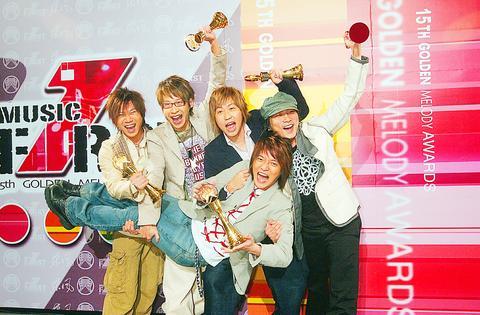Intermittent rain over Taipei couldn't dampen the atmosphere for approximately 2,000 screaming fans who turned up last night outside the Sun Yat-sen Memorial Hall to watch their favorite pop singers arrive at the 15th Golden Melody Awards, where Taiwanese singer Jay Chou (周杰倫) took the top honors for best album of the year.
His capturing the award came as little surprise to spectators and fans, who have watched Chou come to dominate the Chinese pop-music scene with four albums. Chou has won Golden Melody Awards each of the past three years. In accepting the award, Chou thanked his mother, after whom his winning album was named.
Much of the evening's excitement took place on the red carpet outside the venue, where the wild throng of mostly teenagers pressed against guard rails screaming at the sight of almost the entire pantheon of Mando-pop and Canto-pop stars who filed into the hall.

PHOTO: TAIPEI TIMES
For most fans, however, the Golden Melody Awards marks the high point on the Mandarin pop music calendar.
At one point, an unidentified man stormed onto the red carpet to try to confront the Korean singer Boa, who performed at the ceremony, but was immediately pushed back and after a short scuffle with security personnel, the man disappeared into the crowd.
The Golden Melody Awards -- Taiwan's equivalent of the Grammys -- recognize the best singers, bands and music professionals whose work is done in Mandarin, Taiwanese, Hakka and Taiwan's Aboriginal languages. Nominees for the awards come from Taiwan, China, Hong Kong, Malaysia, Singapore and Thailand and are reviewed by a panel of 30 judges made up of music industry professionals.

PHOTO: TAIPIE TIMES
Along with best album, other major categories at the awards include best male and female singers, best singing group and best band.
In the night's biggest surprise, Sky Wu (
Hong Kong Mando-pop diva Faye Wong (

PHOTO: TAIPEI TIMES
Mandarin female singer for her album To Love (
As many expected, pop rock group Mayday (
The best band category, however, is the only one that recognizes work by rock 'n' roll bands. "We needed this award. It tells us that we didn't choose the wrong path in making our kind of music," A-hsin said backstage.

PHOTO: TAIPEI TIMES
The second big surprise of the evening, after Sky Wu winning the best Mandarin male singer award, came with the relatively new duo Ah-bao (
The mother of the best lyricist awardee, Shawn Song (
Peng Shui-kuang (
Popular music garners the greatest amount of attention at the awards, with 16 categories, but 10 awards are also given to artists working in religious music, children's music, and classical styles of music.
This year's awards tried to put the best face on an industry that has seen its revenues decline by almost two thirds since its peak in 1998.
The decline in album sales as a result of pirating is the most important issue facing the industry, but no mention of these ills throughout the evening's proceedings.
15th Golden MelodyAward Winners
Best Album: Yeh Huei-mei by Jay Chou (
Best musical director: Kuang Sheng (
Best instrumental album: Crystal Boys (
Best composer: Hsieh Hsiao-juan (
Best lyricist: Shawn Song (
Best arrangement: Chong Hsing-min (
Best producer: Lee Hom Wang (
Best Mandarin male singer: Sky Wu (
Best Taiwanese male singer: Chang Yu-wei (
Best Mandarin female singer: Faye Wong (
Best Taiwanese female singer: Showlen Maya (
Best Hakka singer: Xie Yu-wei (
Best Aboriginal singer: Peng Shui-kuang (
Best band: Mayday (
Best singing group: Ah-bao (
Best newcomer: Lin Junjie (

June 2 to June 8 Taiwan’s woodcutters believe that if they see even one speck of red in their cooked rice, no matter how small, an accident is going to happen. Peng Chin-tian (彭錦田) swears that this has proven to be true at every stop during his decades-long career in the logging industry. Along with mining, timber harvesting was once considered the most dangerous profession in Taiwan. Not only were mishaps common during all stages of processing, it was difficult to transport the injured to get medical treatment. Many died during the arduous journey. Peng recounts some of his accidents in

“Why does Taiwan identity decline?”a group of researchers lead by University of Nevada political scientist Austin Wang (王宏恩) asked in a recent paper. After all, it is not difficult to explain the rise in Taiwanese identity after the early 1990s. But no model predicted its decline during the 2016-2018 period, they say. After testing various alternative explanations, Wang et al argue that the fall-off in Taiwanese identity during that period is related to voter hedging based on the performance of the Democratic Progressive Party (DPP). Since the DPP is perceived as the guardian of Taiwan identity, when it performs well,

The Taiwan People’s Party (TPP) on May 18 held a rally in Taichung to mark the anniversary of President William Lai’s (賴清德) inauguration on May 20. The title of the rally could be loosely translated to “May 18 recall fraudulent goods” (518退貨ㄌㄨㄚˋ!). Unlike in English, where the terms are the same, “recall” (退貨) in this context refers to product recalls due to damaged, defective or fraudulent merchandise, not the political recalls (罷免) currently dominating the headlines. I attended the rally to determine if the impression was correct that the TPP under party Chairman Huang Kuo-Chang (黃國昌) had little of a

At Computex 2025, Nvidia CEO Jensen Huang (黃仁勳) urged the government to subsidize AI. “All schools in Taiwan must integrate AI into their curricula,” he declared. A few months earlier, he said, “If I were a student today, I’d immediately start using tools like ChatGPT, Gemini Pro and Grok to learn, write and accelerate my thinking.” Huang sees the AI-bullet train leaving the station. And as one of its drivers, he’s worried about youth not getting on board — bad for their careers, and bad for his workforce. As a semiconductor supply-chain powerhouse and AI hub wannabe, Taiwan is seeing